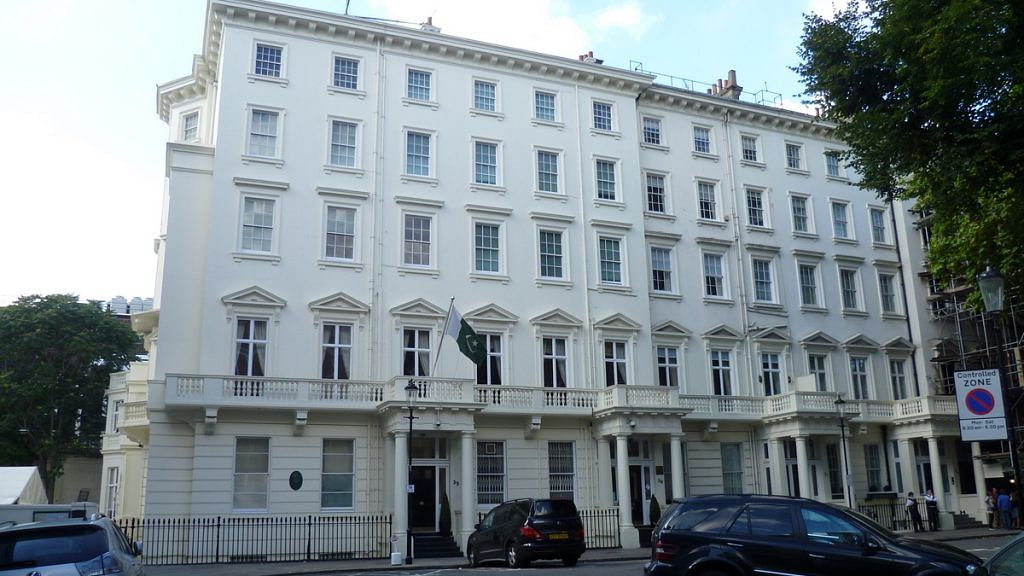New Delhi: A UK arbitration court has ordered debiting Rs 450 crore from the accounts of the Pakistan High Commission in London over non-payment of a penalty by the Islamabad-based National Accountability Bureau (NAB) to Britain’s foreign asset recovery firm Broadsheet LLC.
In episode 662 of ‘Cut The Clutter’, ThePrint’s Editor-in-Chief Shekhar Gupta breaks down the story involving bribery, corruption, intrigue, back-stabbing, deal-making and a mysterious death surrounding this little known private company.
Former Pakistani president General Pervez Musharraf had established the NAB in 1999 and had said that it will be an all powerful body that shall be free from judicial oversight in some ways.
A National Reconciliation Ordinance (NRO) was also passed by Musharraf, under which anyone found guilty, even of murder, could escape prosecution by saying that he or she is leaving the country and not coming back.
“A lot of people took advantage of this, including the Bhuttos, Sharifs and many others,” Gupta said.
The Pakistan Supreme Court later struck it down, calling it “unconstitutional”.
Also read: What declassified US document reveals about Trump administration’s strategy in Indo-Pacific
The story of Broadsheet LLC
Broadsheet LLC is a UK-based company but registered in the tax haven of Isle of Man. It was set up as an international asset recovery firm.
The Musharraf government had signed a contract with this company in 2000 saying if it is able to recover the money asked for, the company will be given 20 per cent of it. The government gave the company 200 names in five installments for whom the money was to be recovered.
The names included the Sharifs, Bhuttos, Zardaris, former army chiefs, three star generals, two former navy chiefs, two former air chiefs and other Pakistani elites.
However, a prominent Pakistani family of Chaudhry Shujaat Hussain was excluded from this “witch hunt” as he was required to set up the Pakistan Muslim League.
“There were many other politicians who were all listed in this, including prominent names like Rao Sikander, Faisal Saleh, Aftab Sherpao, who also decided to leave the Pakistan Peoples Party, and set up another party called Pakistan Peoples Party Patriots, PPPP. Because they did that, they were also let off soon enough and it became quite evident that this was nothing,” Gupta said.
Broadsheet was founded by an American businessman, Jerry James, in Isle of Man, but the company went bankrupt. By 2005, he dissolved the company and James went back to Colorado. He soon set up another company and also named it Broadsheet.
The Pakistani government owes a lot of money to James. His original company had claimed about $17 million from the Pakistani government.
“The Pakistan government had paid him $5 million and the dues were settled,” Gupta said.
In the meanwhile, Kaveh Moussavi, an Iranian and former head of public interest law at the Oxford University, took over Broadsheet. Moussavi renewed the claims with the NAB.
“Pakistan said it had already paid money to Broadsheet in Colorado, while Moussavi said that a company isn’t an individual,” Gupta added.
While Moussavi took the Pakistani government to court, James had in 2011 jumped from the fifth floor of a Paris hotel and died.
Moussavi followed the claim for $17 million with the Pakistani government, reaffirmed by repeated international arbitration court hearings that held the latter liable for wrongfully repudiating a contract and guilty of civil conspiracy.
In a final order in December by the arbitration court, the figure roughly stood at 450 crore Pakistani rupee. The government was also warned that if the amount wasn’t paid, the accounts of the Pakistan High Commission in London will be frozen.
“Moussavi has now said that even though, according to the deal, he can keep 20 per cent of what is recovered, the Pakistan government, instead of recovery, only wants to get evidence against those in opposition,” Gupta said.
Watch the latest episode of CTC here:
Also read: Why Hazaras in Pakistan have been victims of sectarianism & ethnic conflict
